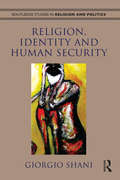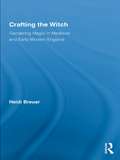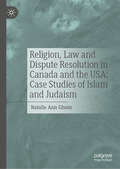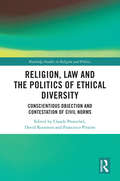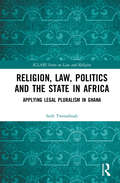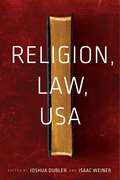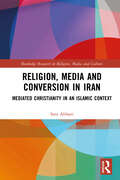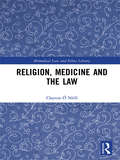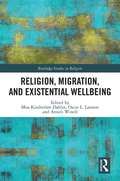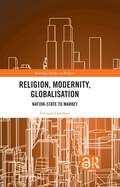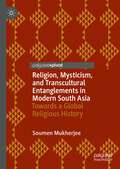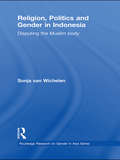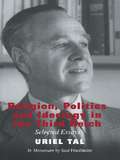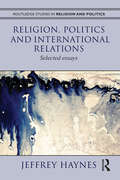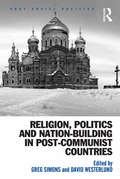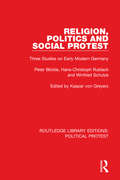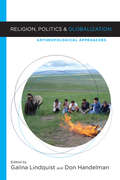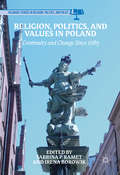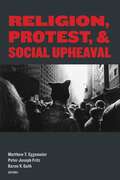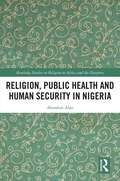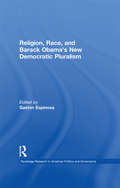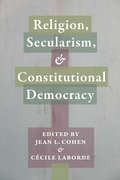- Table View
- List View
Religion, Identity and Human Security (Routledge Studies in Religion and Politics)
by Giorgio ShaniReligion, Identity and Human Security seeks to demonstrate that a major source of human insecurity comes from the failure of states around the world to recognize the increasing cultural diversity of their populations which has resulted from globalization. Shani begins by setting out the theoretical foundations, dealing with the transformative effects of globalization on identity, violence and security. The second part of the volume then draws on different cases of sites of human insecurity around the globe to develop these ideas, examining themes such as: securitization of religious symbols retreat from multiculturalism rise of exclusivist ethno-religious identities post- 9/11 state religion, colonization and the ‘racialization’ of migration Highlighting that religion can be a source of both human security and insecurity in a globalizing world, Shani offers a ‘critical’ human security paradigm that seeks to de-secularize the individual by recognizing the culturally contested and embedded nature of human identities. The work argues that religion serves an important role in re-embedding individuals deracinated from their communities by neo-liberal globalization and will be of interest to students of International Relations, Security Studies and Religion and Politics.
Religion, Language, and Power (Routledge Studies in Religion)
by Nile Green Mary Searle-ChatterjeeReligion, Language and Power shows that the language of ‘religion’ is far from neutral, and that the packaging and naming of what English speakers call ‘religious’ groups or identities is imbued with the play of power. Religious Studies has all too often served to amplify voices from other centers of power, whether scripturalist or otherwise normative and dominant. This book’s de-centering of English classifications goes beyond the remit of most postcolonial studies in that it explores the classifications used in a range of languages — including Arabic, Sanskrit, Chinese, Greek and English — to achieve a comparative survey of the roles of language and power in the making of ‘religion’ . In contextualizing these uses of language, the ten contributors explore how labels are either imposed or emerge interactively through discursive struggles between dominant and marginal groups. In dealing with the interplay of religion, language and power, there is no other book with the breadth of this volume.
Religion, Law and Dispute Resolution in Canada and the USA: Case Studies of Islam and Judaism
by Natalie Ann GhosnThe book is about the role of religious leadership in settling disputes of a legal nature within religious communities and the effects of this process on immigrant integration in Canada and the USA. The community-based practice of law in Jewish (Orthodox, Conservative and Reform) & Muslim (Sunni) communities in Canada and the USA are the communities studied here. The role of religious leadership, the gender implications of this type of dispute resolution and the implications for immigrant integration are all explored among a number of other topics.
Religion, Law and the Politics of Ethical Diversity: Conscientious Objection and Contestation of Civil Norms (Routledge Studies in Religion and Politics)
by Claude Proeschel, David Koussens and Francesco PirainoThis book provides a multidisciplinary and comparative look at the contemporary phenomenon of conscientious objection or contestation in the name of religion and examines the key issues that emerge in terms of citizenship and democracy. These are analysed by looking at the different ways of challenging or contesting a legal obligation on the grounds of religious beliefs and convictions.The authors focus on the meaning of conscientious objection which asserts the legitimacy of convictions – in particular religious convictions – in determining the personal or collective relevance of the law and of public action. The book begins by examining the main theoretical issues underlying conscientious objection, exploring the implications of the protection of freedom of conscience, the place of religion in the secular public sphere and the recognition and respect of ethical pluralism in society. It then focuses on the question of exemptions and contestations of civil norms, using a multidisciplinary approach to highlight the multiple and diverse issues surrounding them, as well as the motives behind them. This book will be of great interest to scholars, specialists and graduate and advanced undergraduate students who are interested in issues of religious diversity. Researchers and policymakers in think-tanks, NGOs and government units will find the volume useful in identifying key issues in understanding the phenomenon of conscientious objection and its implications in managing ethical diversity in contemporary societies.
Religion, Law, Politics and the State in Africa: Applying Legal Pluralism in Ghana (ICLARS Series on Law and Religion)
by Seth TweneboahApplying a legal pluralist framework, this study examines the complex interrelationships between religion, law and politics in contemporary Ghana, a professedly secular State characterised by high levels of religiosity. It aims to explore legal, cultural and moral tensions created by overlapping loci of authority (state actors, traditional leaders and religious functionaries). It contends that religion can function as an impediment to Ghana’s secularity and also serve as an integral tool for realising the State’s legal ideals and meeting international human rights standards. Using three case studies – legal tensions, child witchcraft accusations and same-sex partnerships – the study illustrates the ways that the entangled and complicated connections between religion and law compound Ghana’s secular orientation. It suggests that legal pluralism is not a mere analytical framework for describing tensions, but ought to be seen as part of the solution. The study contributes to advancing knowledge in the area of the interrelationships between religion and law in contemporary African public domain. This book will be a valuable resource for those working in the areas of Law and Religion, Religious Studies, African Studies, Political Science, Legal Anthropology and Socio-legal Studies.
Religion, Law, USA (North American Religions #8)
by Isaac Weiner Joshua DublerOffers insight into the complex relationship between religion and law in contemporary America Why religion? Why law? Why now? In recent years, the United States has witnessed a number of high-profile court cases involving religion, forcing Americans to grapple with questions regarding the relationship between religion and law. This volume maps the contemporary interplay of religion and law within the study of American religions. What rights are protected by the Constitution’s free exercise clause? What are the boundaries of religion, and what is the constitutional basis for protecting some religious beliefs but not others? What characterizes a religious-studies approach to religion and law today? What is gained by approaching law from the vantage point of religious studies, and what does attention to the law offer back to scholars of religion? Religion, Law, USA considers all these questions and more. Each chapter considers a specific keyword in the study of religion and law, such as “conscience,” “establishment,” “secularity,” and “personhood.” Contributors consider specific case studies related to each term, and then expand their analyses to discuss broader implications for the practice and study of American religion. Incorporating pieces from leading voices in the field, this book is an indispensable addition to the scholarship on religion and law in America.
Religion, Media and Conversion in Iran: Mediated Christianity in an Islamic Context (Routledge Research in Religion, Media and Culture)
by Sara AfshariReligion, Media and Conversion in Iran studies the reception of Farsi Christian television channels by Muslim audiences in Iran: their motivations in viewing the Christian message, their methods of interpretation and negotiation with different media texts and their process of changing or altering their religion. Rooted in empirical research, it analyses three hundred narratives drawn from the audiences of four Farsi Christian satellite television channels between 2010 and 2015, investigating their conversion to Christianity through that medium. The research examines factors that influenced both their interpretations of, and negotiations with, the religious media message, and their process of changing, adding to or modifying their belief system, including their understanding of religious conversion. Drawing on Reception Theory, the book investigates the negotiations between meaning making and mediation and the process of faith transformation against the background of the sociology of religion and culture in contemporary Iran. By offering a unique insight into the way in which media and religion influence each other, this book is a great resource for any scholar of Religious Studies, Media Studies and Middle East Studies and will also be useful for religious media practitioners.
Religion, Medicine and the Law (Biomedical Law and Ethics Library)
by Clayton Ó NéillIs the legal protection that is given to the expression of Abrahamic religious belief adequate or appropriate in the context of English medical law? This is the central question that is explored in this book, which develops a framework to support judges in the resolution of contentious cases that involve dissension between religious belief and medical law, developed from Alan Gewirth’s Principle of Generic Consistency (PGC). <P><P>This framework is applied to a number of medical law case studies: the principle of double effect, ritual male circumcision, female genital mutilation, Jehovah’s Witnesses (adults and children) who refuse blood transfusions, and conscientious objection of healthcare professionals to abortion. <P><P>The book also examines the legal and religious contexts in which these contentious cases are arbitrated. It demonstrates how human rights law and the proposed framework can provide a gauge to measure competing rights and apply legitimate limits to the expression of religious belief, where appropriate. The book concludes with a stance of principled pragmatism, which finds that some aspects of current legal protections in English medical law require amendment.
Religion, Migration, and Existential Wellbeing: Theorizing the Role of Religion in Contemporary Migration and Integration Governance (Routledge Studies in Religion)
by Moa Kindström DahlinThis book uses the very latest research to examine current interactions between religion, migration and existential wellbeing. In particular, it demonstrates the role of religion and religious organizations in the social, medical and existential wellbeing of immigrants within their host societies. By focusing on the role and politics of religion and religious organisations as well as the religious identity and faith of individuals, it highlights the connection between existential wellbeing, integration and social cohesion. The book brings together researchers from various disciplines taking on the challenge to elaborate on the theme of this book from different perspectives, using different methods and theories with a wide selection of cases from various parts of the world. The value of multidisciplinary research on the role of religion in a globalised society – locally, nationally and internationally – is important for understanding the composition and potential solutions to social and political problems. Religious aspects and organisations are present in legal, political and social forms of governance and form the basis for future research on e.g. secularisation, democracy, minorities, human rights, welfare, healthcare and identity formation. These and other related topics are discussed in this book. This book is an up-to-date and multifaceted study of how religion engages with the mass movement of peoples. As such, it will be of great interest to any scholar of Religious Studies, Migrant Studies, Sociology of Religion, Religion and Politics, as well as Legal Studies with a human right focus.
Religion, Modernity, Globalisation: From Nation-State to Market (Routledge Studies in Religion)
by François GauthierThis book argues that the last four decades have seen profound and important changes in the nature and social location of religion, and that those changes are best understood when cast against the associated rise of consumerism and neoliberalism. These transformations are often misunderstood and underestimated, namely because the study of religion remains dependent on the secularisation paradigm which can no longer provide a sufficiently fruitful framework for analysis. The book challenges diagnoses of transience and fragmentation by proposing an alternative narrative and set of concepts for understanding the global religious landscape. The present situation is framed as the result of a shift from a National-Statist to a Global-Market regime of religion. Adopting a holistic perspective that breaks with the current specialisation tendencies, it charts the emergence of the State and the Market as institutions and ideas related to social order, as well as their changing rapports from classical modernity to today. Breaking with a tradition of Western-centeredness, the book offers probing enquiries into Indonesia and a synthesis of global and Western trends. This long-awaited book offers a bold new vision for the social scientific study of religion and will be of great interest to all scholars of the Sociology and Anthropology of religion, as well as Religious Studies in general.
Religion, Modernity, Globalisation: Nation-State to Market (Routledge Studies in Religion)
by François GauthierThis book argues that the last four decades have seen profound and important changes in the nature and social location of religion, and that those changes are best understood when cast against the associated rise of consumerism and neoliberalism. These transformations are often misunderstood and underestimated, namely because the study of religion remains dependent on the secularisation paradigm which can no longer provide a sufficiently fruitful framework for analysis.The book challenges diagnoses of transience and fragmentation by proposing an alternative narrative and set of concepts for understanding the global religious landscape. The present situation is framed as the result of a shift from a National-Statist to a Global-Market regime of religion. Adopting a holistic perspective that breaks with the current specialisation tendencies, it charts the emergence of the State and the Market as institutions and ideas related to social order, as well as their changing rapports from classical modernity to today. Breaking with a tradition of Western-centeredness, the book offers probing enquiries into Indonesia and a synthesis of global and Western trends.This long-awaited book offers a bold new vision for the social scientific study of religion and will be of great interest to all scholars of the Sociology and Anthropology of religion, as well as Religious Studies in general.The Open Access version of this book, available at http://www.taylorfrancis.com, has been made available under a Creative Commons-Attribution-Non Commercial-No Derivatives (CC BY-NC-ND) 4.0 license.
Religion, Mysticism, and Transcultural Entanglements in Modern South Asia: Towards a Global Religious History
by Soumen MukherjeeThis book explores the location of spirituality and mysticism in modern Indian religious and intellectual life. It examines select personalities and their ideas since the early twentieth century, their role in the interwoven spheres of socio-religious and political thought, and in burgeoning spiritual imaginaries, often at the intersection of academic and public discourse. As part of a global ecumene connected by affective bonds, these spiritual cosmopolitans often defied binary frameworks (East/ West; imperial core/ periphery; colonizer/ colonized), and in the upshot reappraised and recast the very concept of religion in response to overarching ‘this-worldly’ exigencies.
Religion, National Identity, and Confessional Politics in Lebanon
by Robert G. RabilTracing the rise of Islamism in Lebanon and its attempt to Islamize society and state by the reverse integration of society and state into the project of Islamism, this book looks at Lebanonagainst a background of weak and contestednational identity and capricious interaction between religious affiliation and confessional politics, and attempts to illustrate in detailed analysis this "comprehensive" project of Islamism according to its ideological and practical evolutionary change. The author demonstrates that, despite ideological, political and confessional incongruities and concerns, Islamism, in both its Sunni and Shi'a variants, has maintained a unity of purpose in pursuing its project: "Jihad" against Israel and abolishment of political sectarianism. "
Religion, Politics and Gender in Indonesia: Disputing the Muslim Body (Routledge Research on Gender in Asia Series)
by Sonja van WichelenThe political downfall of the Suharto administration in 1998 marked the end of the "New Order" in Indonesia, a period characterized by 32 years of authoritarian rule. It opened the way for democracy, but also for the proliferation of political Islam, which the New Order had discouraged or banned. Many of the issues raised by Muslim groups concerned matters pertaining to gender and the body. They triggered heated debates about women’s rights, female political participation, sexuality, pornography, veiling, and polygamy. The author argues that public debates on Islam and Gender in contemporary Indonesia only partially concern religion, and more often refer to shifting moral conceptions of the masculine and feminine body in its intersection with new class dynamics, national identity, and global consumerism. By approaching the contentious debates from a cultural sociological perspective, the book links the theoretical domains of body politics, the mediated public sphere, and citizenship. Placing the issue of gender and Islam in the context of Indonesia, the biggest Muslim-majority country in the world, this book is an important contribution to the existing literature on the topic. As such, it will be of great interest to scholars of anthropology, sociology, and gender studies.
Religion, Politics and Ideology in the Third Reich: Selected Essays (Totalitarianism Movements and Political Religions)
by Uriel TalIn a perceptive analysis of diverse source material, the essays of the late Uriel Tal in this volume uncover the dynamics of the secularization of religion, and the sacralization of politics in the Nazi era. Through a process of inversion of meaning, concepts such as race, blood, soil, state, nation and Führer were brought into the realm of faith, mission, salvation, sacredness and myth, thereby acquiring absolute significance. Within this Nazi worldview, the Jew epitomised the arch enemy, both as a symbol and as the concrete embodiment of all that Nazism sought to negate: Western civilisation, monotheism, critical rationalism and humanism.
Religion, Politics and International Relations: Selected Essays (Routledge Studies in Religion and Politics)
by Jeff HaynesA leading authority in the discipline, Jeffrey Haynes has contributed to many of the most significant debates in the fields of religion & politics and religion & international relations in the last twenty years. This book brings together many of his most influential essays, offering a comprehensive analysis of religious actors and their political goals. In recent years, scholars have identified a range of religious actors with a variety of political goals. The aim of this collection is to identify and examine political activities of selected religious actors in both domestic and international contexts. The introductory chapter sets the scene for the collection, providing a clear understanding of why, how and when religious actors act politically both within and between countries. Over the course of 15 essays, Jeffrey Haynes presents a survey of the interaction of religion and politics, both domestically and internationally, in relation to a variety of issues, and draws the findings together in a new conclusion written for the volume. This work will be of great interest to the growing number of scholars and students and practitioners internationally who work on religion and politics, in both domestic and international contexts.
Religion, Politics and Nation-Building in Post-Communist Countries (Post-Soviet Politics)
by Greg Simons David WesterlundThe increasing significance and visibility of relationships between religion and public arenas and institutions following the fall of communism in Europe provide the core focus of this fascinating book. Leading international scholars consider the religious and political role of Christian Orthodoxy in the Russian Federation, Romania, Georgia and Ukraine alongside the revival of old, indigenous religions, often referred to as 'shamanistic' and look at how, despite Islam’s long history and many adherents in the south, Islamophobic attitudes have increasingly been added to traditional anti-Semitic, anti-Western or anti-liberal elements of Russian nationalism. Contrasts between the church’s position in the post-communist nation building process of secular Estonia with its role in predominantly Catholic Poland are also explored. Religion, Politics and Nation-Building in Post-Communist Countries gives a broad overview of the political importance of religion in the Post-Soviet space but its interest and relevance extends far beyond the geographical focus, providing examples of the challenges in the spheres of public, religious and social policy for all transitional countries.
Religion, Politics and Social Protest: Three Studies on Early Modern Germany (Routledge Library Editions: Political Protest #19)
by Peter Blickle Hans-Christoph Rublack Winfried SchulzeThis book, first published in 1984, brings together three essays written by specialists in German history of the sixteenth and seventeenth centuries whose important work is little known to English-speaking historians. Peter Blickle argues for a strong connection between the theology of the Reformation and the ideologies of the social protest movements of the period. Hans-Christoph Rublack takes a wider theme of the political and social norms in urban communities in the Holy Roman Empire and emphasises the ideas of justice, peace and unity held within the community despite the upheavals of revolution and protest. Winfried Schulze provides a comparative assessment of early modern peasant resistance within the Holy Roman Empire.
Religion, Politics, And Globalization: Anthropological Approaches (Berghahn Ser.)
by Galina Don HandelmanWhile social scientists, beginning with Weber, envisioned a secularized world, religion today is forthrightly becoming a defining feature of life all around the globe. The complex connections between religion and politics, and the ways in which globalization shapes these processes, are central themes explored in this volume by leading scholars in the field of religion. Does the holism of numerous past and present day cosmologies mean that religions with their holistic orientations are integral to human existence? What happens when political ideologies and projects are framed as transcendental truths and justified by Divine authority? How are individual and collective identities shaped by religious rhetoric, and what are the consequences? Can mass murder, deemed terrorism, be understood as a form of ritual sacrifice, and if so, what are the implications for our sensibilities and practices as scholars and citizens? Using empirical material, from historical analyses of established religions to the everyday strife of marginalized groups such as migrants and dissident movements, this volume deepens the understanding of processes that shape the contemporary world.
Religion, Politics, and Values in Poland: Continuity and Change Since 1989 (Palgrave Studies in Religion, Politics, and Policy)
by Sabrina P. Ramet and Irena BorowikThis volume brings together leading scholars to examine how the Church has brought its values into the political sphere and, in the process, alienated some of the younger generation. Since the disintegration of the communist one-party state at the end of the 1980s, the Catholic Church has pushed its agenda to ban abortion, introduce religious instruction in the state schools, and protect Poland from secular influences emanating from the European Union. As one of the consequences, Polish society has become polarized along religious lines, with conservative forces such as Fr. Rydzyk’s Radio Maryja seeking to counter the influence of the European Union and liberals on the left trying to protect secular values. This volume casts a wide net in topics, with chapters on Pope John Paul II, Radio Maryja, religious education, the Church’s campaign against what it calls “genderism,” and the privatization of religious belief, among other topics.
Religion, Protest, and Social Upheaval
by Matthew T. Eggemeier, Peter Joseph Fritz, and Karen V. GuthRepresents some of the best, cutting-edge thinking available on multiple forms of social upheaval and related grassroots movements.From the January 2017 Women’s March to the August 2017 events in Charlottesville and the 2020 protests for racial justice in the wake of George Floyd’s murder, social upheaval and protest have loomed large in the United States in recent years. The varied, sometimes conflicting role of religious believers, communities, and institutions in such events and movements calls for scholarly analysis. Arising from a conference held at the College of the Holy Cross in November 2017, Religion, Protest, and Social Upheaval gathers contributions from ten scholars in religious studies, theology and ethics, and gender studies—from seasoned experts to emerging voices—to illuminate this tumultuous era of history and the complex landscape of social action for economic, racial, political, and sexual and gender justice.The contributors consider the history of resistance to racial capitalist imperialism from W. E. B. Du Bois to today; the theological genealogy of the capitalist economic order, and Catholic theology’s growing concern with climate change; affect theory and the rise of white nationalism, theological aesthetics, and solidarity with migrants; differing U.S. Christian churches’ responses to the “revolutionary aesthetics” of the Black Lives Matter movement; Muslim migration and the postsecular character of Muslim labor organizing in the United States; shifts in moral reasoning and religiosity among U.S. women’s movements from the 1960s to today; and the intersection of heresy discourse and struggles for LGBTQ+ equality among Korean and Korean-American Protestants. With this pluralistic approach, Religion, Protest, and Social Upheaval offers a snapshot of scholarly religious responses to the crises and promises of the late 2010s and early 2020s. Representing the diverse coalitions of the religious left, it provides groundbreaking analysis, charts trajectories for further study and action, and offers visions for a more hopeful future.
Religion, Public Health and Human Security in Nigeria (Routledge Studies on Remote Places and Remoteness)
by Abiodun AlaoThis book critically examines the intersection of religion, public health and human security in Nigeria. Focusing on Christianity, Islam, traditional religions and "intra-religious" doctrinal divergencies, the book explores the impact faith has on health-related decisions and how this affects security in Nigeria. The book assesses the connection between religion and five contemporary major health and medical issues in the country. This includes the issue of epidemics and pandemics such as the Covid-19 pandemic, vaccines, contraception, blood transfusion and the controversies associated with "miracle healing". In particular, the book explores situations where individuals have the power of choice but instead, embraces faith and religious positions that contradict science in the management of their health and, in the process, expose themselves and others to personal health insecurity. It investigates aspects of human security including the wider international ramifications of health issues, approaches to cures and the interpretation of causes of diseases, as well as the ethno-religious connotations of such interpretations. Exploring key issues that have brought religion into the politics of health and human security in Nigeria, this book will be of interest to students and scholars in the field of African Religion, African Politics, African Studies, public health, security, and Sociology.
Religion, Race, and Barack Obama's New Democratic Pluralism (Routledge Research in American Politics and Governance)
by Gastón EspinosaContrary to popular claims, religion played a critical role in Barack Obama’s 2008 election as president of the United States. Religion, race, and gender entered the national and electoral dialogue in an unprecedented manner. What stood out most in the 2008 presidential campaign was not that Republicans reached out to religious voters but that Democrats did—and with a vengeance. This tightly edited volume demonstrates how Obama charted a new course for Democrats by staking out claims among moderate-conservative faith communities and emerged victorious in the presidential contest, in part, by promoting a new Democratic racial-ethnic and religious pluralism. Comprising careful analysis by leading experts on religion and politics in the United States, Gastón Espinosa’s book details how ten of the largest segments of the American electorate voted and why, drawing on the latest and best available data, interviews, and sources. The voting patterns of Mainline Protestants, Evangelicals, Catholics, Jews, Muslims, and seculars are dissected in detail, along with the intersection of religion and women, African Americans, Latinos, and Asian Americans. The story of Obama’s historic election is an insightful prism through which to explore the growing influence of religion in American politics.
Religion, Race, and the Making of Confederate Kentucky, 1830-1880
by Luke E. HarlowThis book sheds new light on the role of religion in the nineteenth-century slavery debates. In it, Luke E. Harlow argues that ongoing conflict over the meaning of Christian "orthodoxy" constrained the political and cultural horizons available for defenders and opponents of American slavery. The central locus of these debates was Kentucky, a border slave state with a long-standing antislavery presence. Although white Kentuckians famously cast themselves as moderates in the period and remained with the Union during the Civil War, their religious values showed no moderation on the slavery question. When the war ultimately brought emancipation, white Kentuckians found themselves in lockstep with the rest of the Confederate South. Racist religion thus paved the way for the making of Kentucky's Confederate memory of the war, as well as a deeply entrenched white Democratic Party in the state.
Religion, Secularism, and Constitutional Democracy (Religion, Culture, and Public Life #20)
by Cécile Laborde Jean CohenPolarization between political religionists and militant secularists on both sides of the Atlantic is on the rise. Critically engaging with traditional secularism and religious accommodationism, this collection introduces a constitutional secularism that robustly meets contemporary challenges. It identifies which connections between religion and the state are compatible with the liberal, republican, and democratic principles of constitutional democracy and assesses the success of their implementation in the birthplace of political secularism: the United States and Western Europe.Approaching this issue from philosophical, legal, historical, political, and sociological perspectives, the contributors wage a thorough defense of their project's theoretical and institutional legitimacy. Their work brings fresh insight to debates over the balance of human rights and religious freedom, the proper definition of a nonestablishment norm, and the relationship between sovereignty and legal pluralism. They discuss the genealogy of and tensions involving international legal rights to religious freedom, religious symbols in public spaces, religious arguments in public debates, the jurisdiction of religious authorities in personal law, and the dilemmas of religious accommodation in national constitutions and public policy when it violates international human rights agreements or liberal-democratic principles. If we profoundly rethink the concepts of religion and secularism, these thinkers argue, a principled adjudication of competing claims becomes possible.
